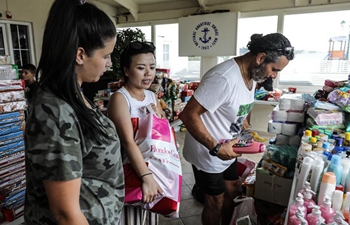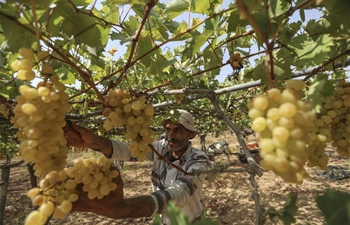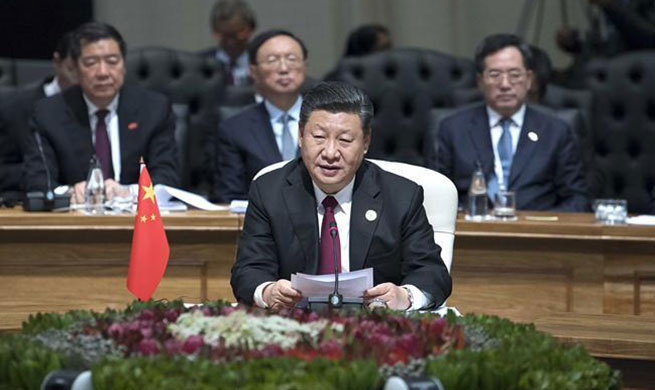ADEN, Yemen, July 27 (Xinhua) -- The Saudi-led Arab coalition stepped up military operations by launching a series of airstrikes against Iran-backed Houthi rebels in the Red Sea coastal city of Hodeidah on Friday, a military official told Xinhua.
Since the Houthi attack against two Saudi Arabia's giant crude carriers on Wednesday, the Saudi-led coalition has intensified airstrikes on Houthi-controlled areas in Hodeidah, the local military source said on condition of anonymity.
Intensive airstrikes are targeting military police headquarters and other bases controlled by the Houthi fighters in Hodeidah, causing damage to the city's infrastructure, according to the source.
The airstrikes also badly affected a number of houses and factories near the Houthi-controlled sites in Zabid, Durayhmi and Zayidiyah areas in Hodeidah, he added.
On Thursday night, residents told Xinhua by phone that numerous Houthi-held areas in downtown Hodeidah were struck by Saudi-led airstrikes.
Dozens of families were forced to flee their homes following the intensive airstrikes. There was no immediate word on casualties.
The pro-Houthi Al Masirah television station said on Friday that warplanes of the Saudi-led coalition shelled Hodeidah's seaport, providing no further details.
Officials of the Saudi-backed Yemeni government based in the southern port city of Aden refused to verify such reports.
Meanwhile, the media center of the pro-government Giants Brigades reported that several battalions were mobilized to storm Houthi-controlled areas in Hodeidah, including the historic city of Zabid.
An army commander told Xinhua by phone that the anti-Houthi forces, backed by the United Arab Emirates (UAE), received instructions to advance militarily and liberate the city from rebels.
The intensifying fighting came just hours after the United Nations special envoy to Yemen Martin Griffiths left the Houthi-controlled capital Sanaa following a three-day visit aimed at reviving the stalled peace process between the two warring rivals.
Griffiths held meetings with high-ranking Houthi leaders in Sanaa, but they refused to accept an initiative demanding their full withdrawal from Hodeidah as a precondition for resuming peace negotiations, according to local Yemeni sources.
Observers say the UN envoy failed to stop the ongoing fighting and the Saudi-backed government of President Abd-Rabbu Mansour Hadi might order the armed forces to resume the offensive particularly after the latest military escalation started by the rebels.
On Wednesday, two oil tankers belonging to the Saudi National Shipping Company, each carrying two million barrels of crude oil, were attacked by the Houthi rebels in the Red Sea when crossing the Strait of Bab el-Mandeb.
The Houthi attack forced Saudi Arabia to suspend all shipments of crude oil through the strait until navigation could be secured.
Yemeni Vice President Ali Mohsen described the Houthi attack against Saudi oil tankers as a deliberate terror attack aimed at disrupting the maritime traffic and obstructing the tireless efforts the UN envoy is making for peace.
On June 13, the Saudi-led Arab coalition, in support of the internationally-recognized government of President Hadi, declared a major assault to recapture Hodeidah and Yemen's western Red Sea coast from Houthis.
The Yemeni government and Saudi Arabia have repeatedly accused the Houthis of using the port to smuggle in Iranian weapons. Both Houthis and Iran have denied the accusation.
Humanitarian agencies have warned of any attack on the port, saying it would lead to the world's biggest humanitarian catastrophe in modern history.
Hodeidah is the single most important point of entry for food and basic supplies to Yemen's northern provinces controlled by Houthis, including the capital Sanaa.
The United Nations reported that more than 121,000 residents have fled the war-torn city of Hodeidah and other parts of the namesake province since June 1.

















